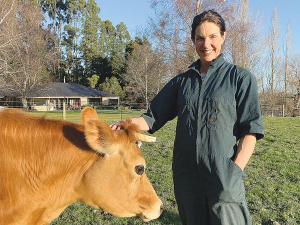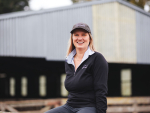About two-thirds of calves in New Zealand don’t get enough good quality colostrum as newborns and this is an underlying cause of most scours outbreaks.
You can figure out how well your farm is doing at managing colostrum by asking your vet to blood test approximately 10 healthy 2-7 day old calves to check for failure of passive transfer of antibodies from colostrum.
Cows that are well-fed and milked soon after calving have better quality colostrum than poorly-fed animals where first milking is delayed.
If you have enough “good” gold colostrum for newborns, feed your poorer quality gold colostrum (tested with a refractometer) together with your transition milk (milkings 2-8) to older calves. It’s still a great source of nutrition and it provides some short-term protection against scours-causing pathogens at the gut level.
However, even despite the best laid plans, sometimes calves will still get scours. A calf gets scours when it accidentally ingests more scours-causing pathogens than its immune system can handle. Unfortunately, the pathogens that cause scours can be found in the faecal material of healthy animals, and they can stay in the environment for days or even months, so all calves will have some exposure.
You can reduce the risk of calves getting sick by keeping colostrum, calf milk and the calves’ environment as clean as possible.
Tips to reduce risk:
Do not use colostrum and milk from scouring cows
Clean dirty teats with low pressure, clean water and ensure treats are dried using paper towels before cupping
Keep colostrum and transition milk in covered containers after collection. Use it asap or add a colostrum preserver for longer term storage
Clean & disinfect all calf feeding equipment and test buckets daily
At each feeding, begin with the new-born calves first. Then, feed all the healthy animals, moving from youngest to oldest. Feed sick pens last, ideally with dedicated equipment
Divide calf pens from one another with solid, easy-to-clean plastic or metal partitions or at least isolate sick pens with solid partitions
Keep enough fresh bedding in each pen so that calves are always dry
Regularly spraying pens with disinfectant will help reduce the environmental contamination but effectiveness is lost when organic matter (e.g. faeces) is present
As calves come in, fill the shed pen-by-pen, so they’re with other calves their age. Leave them in the same pen until they go outside. This is sometimes called “all-in, all-out” management
Remove an individual sick calf from a pen of healthy calves as soon as you see that it’s scouring
Ideally, after they’ve recovered, these sick calves should go into another “recovered calf pen” instead of back with healthy calves
If more than a third of the animals in a pen are scouring, leave all the calves together and make that a sick pen
Clean and disinfect your boots, waterproofs, and change your gloves whenever you move from a sick pen to a healthy pen. All sick animals should be treated last so you do not accidentally infect the healthy calves. Change foot baths daily
Here is a summary of what to do if you have scouring calves:
Isolate individual scouring calves or pens of scouring calves as early as possible
Check your hygiene and colostrum management practices. Watch the Top Farmers’ series of videos for more information visit www.topfarmers.co.nz
Get your vet involved immediately to help you contain the current outbreak and prevent an outbreak from happening again. Taking fresh fecal samples will help understand the cause
Alternate milk and electrolyte feeds to scouring calves (never mix milk and electrolytes together in the same feed), provide 6-8 litres of total fluids each day. Smaller more frequent feeding at least 2 hours apart are better than 1 or 2 large feeds
Tube calves if they won’t drink. Provide free choice electrolytes overnight in pens of scouring calves, and ensure clean water is always available to all calves
Treat scouring calves with any other medications prescribed by your vet. Check with your vet that you’re using them correctly. For example, Halocur is recommended for treatment and prevention of outbreaks of Cryptosporidiosis
Lastly, consider vaccinating the herd before calving to protect against scours with Rotavec Corona. The colostrum from animals vaccinated with Rotavec Corona, is supercharged to contain more antibodies against Rotavirus, Coronavirus and E.Coli than colostrum from unvaccinated cows.
Furthermore, calves fed colostrum from cows vaccinated with Rotavec Corona shed less rotavirus & coronavirus in their faeces, reducing disease spread to other calves and reducing environmental contamination.
Consistently doing these things requires constant attention to detail, if you’re able to get the whole team on board before calving season begins, then you’ll save time, money, stress, and, most importantly, calves.
Dr Penny Mehrtens is veterinary advisor, MSD Animal Health


















